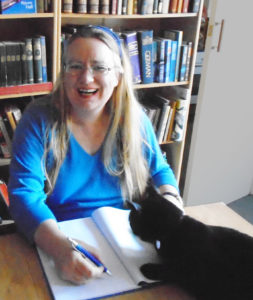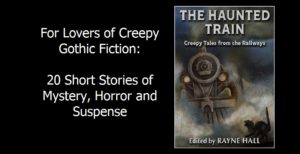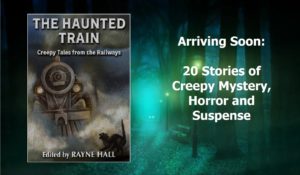The Haunted Train: Creepy Tales from the Railways
Edited by Rayne Hall
First off, I love that the editor left each story it its original American or British English! I really feel that adds to a reader’s impressions, perceptions, and assumptions when consuming literature. I was also very happy to see a decent selection of stories from a variety of writers with different genders, heritages, and landscapes to take inspiration from.
I’ve done my best to avoid a terrible amount of spoilers for every single story, but for some it was unavoidable. So please, read at your own spoiler-y risk.
Now then, all aboard!
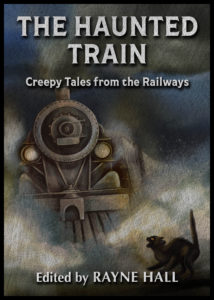
“Beware of Tuesdays”
By Frederick Langridge
I love the mundane, going to work every day, atmosphere. It’s not even a particularly scary story. You make an assumption, just like the narrator does, and you go about your life. But then the phenomena keeps happening, and there’s no history of the incident in the story, and I began to wonder, “What if . . .” And sure enough. The ending paragraph got an audible “oof” and cringe out of me. I’m not typically verbally emotive while reading, so that’s a good mark for the story in my opinion.
◇──◆──◇──◆
“The Drowned Subway”
By Clint Spivey
I didn’t really like two disaster stories in a row. The little boy had far less to do with the story other than seemingly conjuring the other ghosts, which was a letdown because the child was obviously dead and the reader never learns the why. Since the narrator isn’t part of the disaster, why them? What was the point of them seeing these ghosts who stare with jealousy at the living? I had another issue too: I’m assuming this author is a native English speaker, so I’m a bit confused about some of the language and sentence choices. The story uses a huge amount of fragments, and some longer sentences I had to read twice or thrice to understand. The confusion was enough to diminish my enjoyment of the story, and I didn’t find it creepy since there were no real consequences to emotionally attach to.
◇──◆──◇──◆
“Lost in the Fog”
By JD Beresford
Written by a long dead author, this tale was less creepy and more thought-provoking. I liked the train as a ferry into the unknown. All the mist and fog made it seem as though the narrator really had entered a different world and the lone man at the station stood as a sentinel of sorts to warn them away from exploring the strange new place, that was just off-center from reality, further. The story served as warnings against the familiar: what are people capable of when pushed? What happens when want overcomes the niceties of our lives and morphs into “take” instead?
◇──◆──◇──◆
“Why Are Trains Always Late?”
By Nikki Tait
Weird little story. I’d have liked it more with some kind of subtle hint to the narrators more sinister intentions. As it is, the story’s end felt too abrupt, much like a passing train, sure, but since the narrator radiated no signs of malice, it felt unearned.
◇──◆──◇──◆
“A Journey”
By Edith Wharton
Loved this one! Again, not really creepy, but there’s an incredibly good sense of space and character. I’ve never dealt with the narrators woes personally, but I feel I have a good grasp on how she felt about her duties, obligations, guilt, and wants. The idea of being stuck, trapped, with someone you love who’s a hollow of themselves is terrifying in its own right. This story is an emotional train ride! My only (non) issue is the ending, really. I simply wasn’t a fan. But it doesn’t detract from the rest.
◇──◆──◇──◆
“11th Hour Ghost Train to Siam”
By Morgan A. Pryce
A good story. Clearly written recently as it mentions the COVID-19 pandemic; though, I suppose, it could be something straight from fiction. The story starts off at a good pace, and the writing is sound and enjoyable. While I figured out what was going on pretty quick, I still read to the end looking for some closure and possible surprises.
◇──◆──◇──◆
“Funicular Fare”
By Rayne Hall
Great addition! I adored how minor decisions made by many people culminated in disaster for everyone in the car. I liked the werewolf’s system of control and how, after the change, he went from concern to damage control to survival and back again as his humanity returned. I didn’t even realize this one was written by the editor of the collection until I got to the author bio at the end of the story.
◇──◆──◇──◆
“Wolf Station”
By Andrew M Seddon
This was an interesting read. I’m still trying to figure out if the train’s fireman was one of the werewolves too or if he’d been attacked and bitten and also barely made it back to the train. Either way, I was happy with the suspense and the ending. Although I wouldn’t complain about a part two for this one! Maybe an “us versus them” story if the fireman actually was turned. Imagine the tension on the train ride home.
◇──◆──◇──◆
“Gallows Curve”
By Petina Strohmer
This is my favorite story. It is so emotionally poignant, and the grief is palpable. The writer does a wonderful job making you feel for the narrator. As usual, when I read stories where a child dies, I think of the quote, “No parent should have to bury their child,” and it makes this story hurt even more. I can’t imagine the grief. The flow of the story is perfect, and I honestly didn’t expect the ending even though in hindsight it seemed obvious. That’s the mark of an engaging story when I’m too busy reading to analyze!
◇──◆──◇──◆
“The Four-Fifteen Express”
By Amelia Edwards
This was a fun little mystery. The story doesn’t really try and hide that a man had died, but I didn’t expect the twist, so that was nice to experience! I did feel this story was too drawn out; it definitely could have been shorter with no loss of content or tension.
◇──◆──◇──◆
◇──◆──◇──◆
“Bon Appetit”
By Pia Manning
This story . . . is freaking weird with no explanations, and I’m oddly okay with that. Sasquatch, hilariously, I can make sense of. Random soul-eating train? Not so much. But I loved the idea. The author totally missed an opportunity not naming the story “Dead On Arrival” though. No, I don’t think it would be too on the nose.
◇──◆──◇──◆
“Better Late than Never”
By Zoe Tasia
Honestly, this was super cute for a ghost story. Bittersweet. Somehow, I didn’t see the twist coming, so I had a nice “awe” moment. This story started off a bit slow, but it’s worth sticking with.
◇──◆──◇──◆
“The Coffin Express”
By RJ Meldrum
OH, BIG YIKES! My first thought was the coffins were carrying bodies of those dead from plague or something similar. What it actually was didn’t even cross my mind, and I can’t think of many other things more horrifying. I wish this one was longer. I needed a lot more!
◇──◆──◇──◆
“Unleashed at the Terminal”
By Krystal Garrett
This wasn’t the best story in the collection. It was kind of your usual poltergeist. I’d have liked more detail in the backstory to make me care more about the woman and Thomas.
◇──◆──◇──◆
“Between the Ties”
By Joseph S. Walker
Uh, what? I’m a little confused on the editing of this one. I can’t tell if it was on purpose or not, to be honest, but there were some POV issues I noticed that jarred me out of the story. And it wasn’t part of dialogue—you can forgive a lot if it’s between quotation marks. I liked the story, but I ended it a little frustrated because of the technical things.
◇──◆──◇──◆
“The Man with the Watches”
By Arthur Conan Doyle
As usual, I struggled through Doyle’s writing. It’s not bad, but for some reason, this guy puts me to sleep. I feel like it’s the language mixed with dragging story; one day I’ll figure it out. But even then, I find it weird as an avid reader who’s read lots of classics in so many genres and not dozed off. Sorry, Doyle. Better luck next time with me.
◇──◆──◇──◆
“Blood Lake Train”
By Cage Dunn
Another big yikes. I loved the narrator’s descent into madness. I’m pretty sure his wife committed suicide by stepping in front of the train, and all the other people who died to it were accidents. However, in his grief, the engineer blamed the train, because how could he ever blame his beloved wife? Or I’m reading way too much into it and we had a jealous, murder-y train on the loose. But I like my interpretation better.
◇──◆──◇──◆
“Seven Stations in Tokyo”
By Michele Cacano
WELL THAT WAS SAD! I’m a little confused about how Tim died; I guess he was trying to help someone and fell on the tracks and got hit? Or electrocuted? I don’t know, but the ending was bittersweet and just a little hopeful, which I liked. It felt human.
◇──◆──◇──◆
“Out of Order”
By Karen Heard
Yay, I guessed this one! My first thought was culling a disease everyone on the train had been exposed to. The vampirism was a fun twist though. Where’d it come from? Who knows. Or maybe werewolves. Though probably not. Even if this one left me a little confused, I still enjoyed the tension and enclosed space the narrator was forced into. It’s difficult to write a story with so little space for a character to exist in.
◇──◆──◇──◆
“The Signal-Man”
By Charles Dickens
Ah, yes, Dickens. I won’t get into how I feel about Charles Dickens as a person, but, as usual, his writing is fun to read for me. The random rhymes and twisty lines of dialogue are almost lyrical in some places; it’s not something one associates with trains though. However, it could be said the rhythm of the piece denotes trains. Story-wise, I like how eerie it was. There was no blood and gore—which wouldn’t bother me either way—but the atmosphere creates the tension. The dialogue sustains it.
◇──◆──◇──◆
◇──◆──◇──◆
The Haunted Train: Creepy Tales from the Railways definitely had some gems hidden in its pages. My personal favorites were “Beware of Tuesdays” and “Gallows Curve.” I loved the unknown in “Beware of Tuesdays.” I’m usually a fan of the mundane being twisted on its head, and the reasoning was sound. Well, sound enough for a ghost story. “Gallows Curve” definitely wins my top spot for this entire collection. It’s emotionally grounded, and so, so sad. The premise alone is enough to have you sit in horror for a little bit, and the story simply drags that out and makes you care. Which, of course, makes it worse. The author gave us all that and also created a memorable environment!
Overall, I liked this collection of stories quite a bit. More than I expected to, actually, since I’ve never been big on reading short stories. But after reading some of these, I’ll be thinking about them instead of happily saying “train!” and counting the railcars next time I’m stopped at the railroad tracks.
Curious why people seem to love creepy stories so much? Check out what Rayne Hall herself has to say by visiting 7 Reasons Readers Love Scary Stories.
~ Anna
(Entry 28)
-ˏˋAbout the book The Haunted Train: Creepy Tales from the Railwaysˊˎ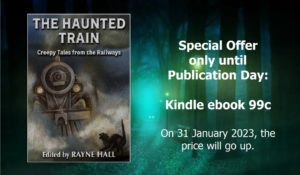
Come on board for a Gothic journey in a funicular railway in Victorian England, a freight train in the Carpathian mountains, a high tech sky train in Bangkok, an underground railway in Tokyo. Visit stations which lure with the promise of safe shelter but harbour unexpected dangers. Meet the people who work on the tracks—stationmasters, porters, signal-men—and those who travel—commuters, tourists, dead bodies, murderers, and ghosts.
In this volume, editor Rayne Hall has collected twenty of the finest—and creepiest—railway tales. The book features the works of established writers, classic authors and fresh voices. Some stories are spooky, some downright scary, while others pose a puzzling mystery.
Are you prepared to come on board this train? Already, the steam engine is huffing in impatience. Listen to the chuff-chuff-chuff from the locomotive and tarattata-tarattata of the giant wheels. Press your face against the dust-streaked window, inhale the smells of coal smoke and old textiles, watch the landscape whoosh past as you leave the familiar behind and journey into the unknown.
But be careful: you can’t know the train’s real destination, nor your fellow travellers’ intentions. Once you’ve closed that door behind you and the wheels start rolling, you may not be able to get out.
The ebook is available for pre-order from Amazon at the special offer price of 99 cents until 31 January 2023.
(After that date, the price will go up.)
The paperback edition will be available soon.















